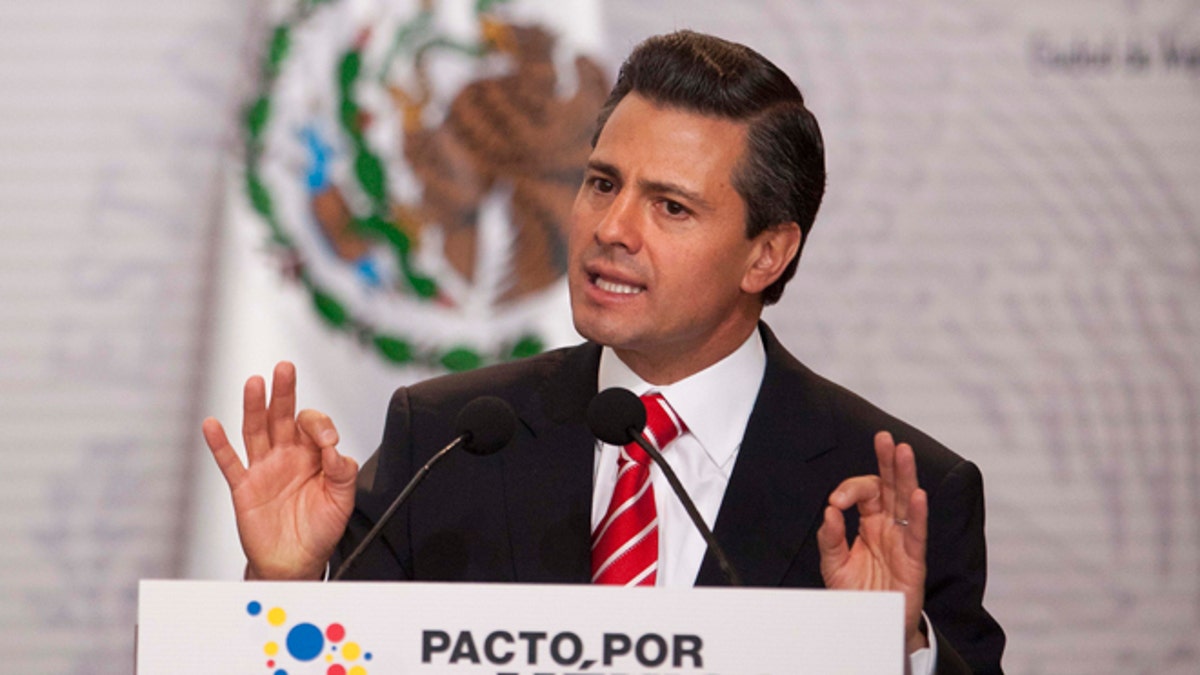
Mexico's President Enrique Pena Nieto speaks during an event an agreement with the three major political parties was signed to create two new national television channels and form a powerful independent regulatory commission along the lines of the U.S. Federal Communications Commission, at the Technological Museum in Mexico City, Monday, March 11, 2013. Pena Nieto on Monday proposed a sweeping overhaul of the weak and chaotic regulations that have allowed the world's richest man and the largest Spanish-language media empire to exert near-total control of Mexico's lucrative telephone and television markets. (AP Photo/Alexandre Meneghini) (AP2013)
The battle lines in the fight over the future of Mexico’s state-run oil monopoly Pemex have been drawn.
On one side is President Enrique Peña Nieto who wants to open the company to private and foreign investment; while on the other end are many longtime Pemex employees and much of the Mexican public who see the aging business as a poignant symbol of the country’s independence. Peña Nieto’s decision on the future of the seven decade old energy monopoly is expected to be made sometime next week.
“Mexico has many new allies and this is a glorious opportunity for the country to take advantage of its resources,” Larry Birns, the director of the Washington D.C.-based think tank The Council on Hemispheric Affairs told Fox News Latino. “The question is, ‘is there a national desire to do so?’’”
Created in 1938 when former Mexican President Lázaro Cárdenas sided with oil workers and expunged all private foreign and domestic companies from the country, Pemex has over the decades become bogged down by corruption, inefficient management and a dearth in technological advancements. Despite being the world’s ninth-largest oil producer, Pemex’s production has declined to 2.5 million barrels a day – down from a high of 3.4 million in 2004 – and the country will become a net energy importer by 2020.
Peña Nieto claims that Pemex’s outdated and poorly maintained equipment is hindering the country’s chances of dredging up oil in the deep waters in the Gulf of Mexico. Pemex can currently detect where the deposits of oil are, but does not have the proper equipment to drill.
“Enrique Peña Nieto has the political capital and votes in congress to put through a constitutional change to break the monopoly of Pemex and allow foreign oil companies to look for oil in the deep Gulf waters,” said Duncan Wood, the director of the Mexico Institute at the Woodrow Wilson International Center for Scholars.
Companies such as ExxonMobil and Petrobras – the Brazilian oil giant that seems like a regional and ideological fit with Pemex – have expressed interest in drilling in Mexican waters. Telecom billionaire Carlos Slim has also given his attention to becoming involved in his country’s oil industry.
The interest from foreign and domestic partners may be there, but many Mexicans contend that selling off Pemex to investors is akin to blasphemy. A 2008 poll found that almost 85 percent of Mexicans did not support private companies investing in Pemex.
When Cardenas nationalized Pemex and kicked out foreign companies it "gave Mexico its true independence from the great powers," Jesus Castillo Sanchez, a 46-year-old handyman, told the Los Angeles Times. "After [the foreigners] bring their oil platforms, they will bring their armies and their troops."
A number of recent explosions, is fledgling output and concerns from lawmakers in Mexico City, however, have cast light on need for technical expertise from outside businesses to help Pemex revamp its production and expand into deep water and shale-rock drilling that are believed to contain more than half of Mexico’s estimated 14 billion barrels of reserves.
“There’s currently an inability to maintain, modernize and reform the company from within,” Birns said.
